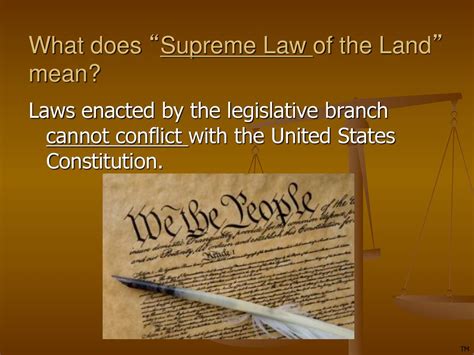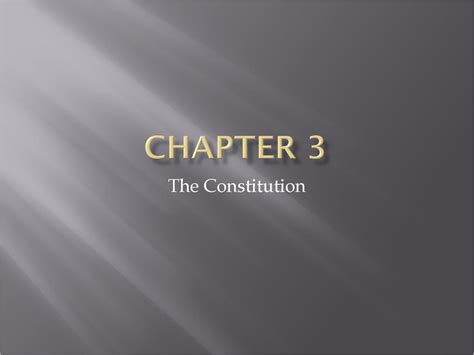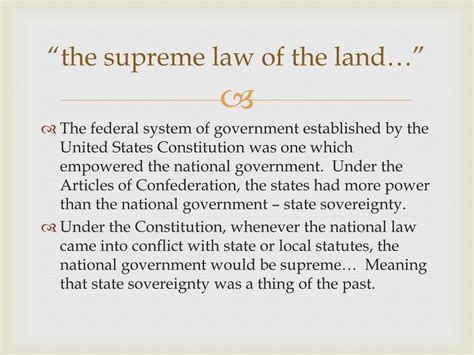What Does The Supreme Law Of The Land Mean

The concept of the "Supreme Law of the Land" is a fundamental principle in the United States, enshrined in the Constitution. It refers to the highest law of the land, which takes precedence over all other laws, regulations, and governmental actions. This principle is rooted in the Supremacy Clause of the Constitution, which states that the Constitution, federal laws, and treaties made under the authority of the Constitution are the supreme law of the land.
Understanding the Supremacy Clause

The Supremacy Clause, found in Article VI, Clause 2 of the Constitution, establishes the hierarchy of laws in the United States. It states that the Constitution, federal laws, and treaties are the supreme law of the land, and that judges in every state are bound by them, regardless of any conflicting state laws or constitutions. This means that any law or action that contradicts the Constitution or federal laws is null and void.
Key Components of the Supreme Law
The Supreme Law of the Land comprises several key components, including:
- The Constitution: The supreme law of the land, which sets out the framework of the federal government and the relationship between the government and the citizens.
- Federal Laws: Laws passed by Congress, which are binding on all states and citizens.
- Treaties: International agreements entered into by the United States, which are also binding on all states and citizens.
| Component | Description |
|---|---|
| Constitution | Framework of the federal government |
| Federal Laws | Laws passed by Congress |
| Treaties | International agreements entered into by the United States |

Implications of the Supreme Law

The Supreme Law of the Land has far-reaching implications for the governance of the United States. It:
- Establishes the Rule of Law: The Supreme Law ensures that the government is bound by a set of rules and principles, rather than the whims of individual leaders or interest groups.
- Protects Individual Rights: The Constitution and federal laws contain numerous provisions that protect the rights of individuals, such as freedom of speech, due process, and equal protection under the law.
- Provides a Framework for Governance: The Supreme Law sets out the framework for the federal government, including the separation of powers, the system of checks and balances, and the relationship between the federal government and the states.
Key Points
- The Supreme Law of the Land is the highest law of the land, taking precedence over all other laws and governmental actions.
- The Supremacy Clause establishes the hierarchy of laws in the United States, with the Constitution, federal laws, and treaties at the top.
- The Supreme Law comprises the Constitution, federal laws, and treaties, and is binding on all states and citizens.
- The Supreme Law establishes the rule of law, protects individual rights, and provides a framework for governance.
- The Supreme Law has been invoked in numerous landmark cases to uphold the rights of individuals and ensure that the government acts within its constitutional authority.
Challenges and Controversies
Despite its importance, the Supreme Law of the Land is not without its challenges and controversies. Some of the issues that have arisen include:
- Interpretation of the Constitution: The Constitution is a living document, and its meaning and interpretation have been the subject of ongoing debate and controversy.
- Separation of Powers: The system of checks and balances has been tested by numerous conflicts between the branches of government, including the executive, legislative, and judicial branches.
- Federalism: The relationship between the federal government and the states has been the subject of ongoing debate, with some arguing that the federal government has overstepped its authority and others arguing that the states have too much power.
What is the significance of the Supremacy Clause?
+The Supremacy Clause establishes the hierarchy of laws in the United States, ensuring that the Constitution, federal laws, and treaties take precedence over all other laws and governmental actions.
How has the Supreme Law of the Land been invoked in landmark cases?
+The Supreme Law of the Land has been invoked in numerous landmark cases, including Marbury v. Madison and Obergefell v. Hodges, to uphold the rights of individuals and ensure that the government acts within its constitutional authority.
What are some of the challenges and controversies surrounding the Supreme Law of the Land?
+Some of the challenges and controversies surrounding the Supreme Law of the Land include interpretation of the Constitution, separation of powers, and federalism, among others.
Meta Description: The Supreme Law of the Land is the highest law of the land, comprising the Constitution, federal laws, and treaties. It establishes the rule of law, protects individual rights, and provides a framework for governance. Learn more about its significance and implications. (147 characters)



